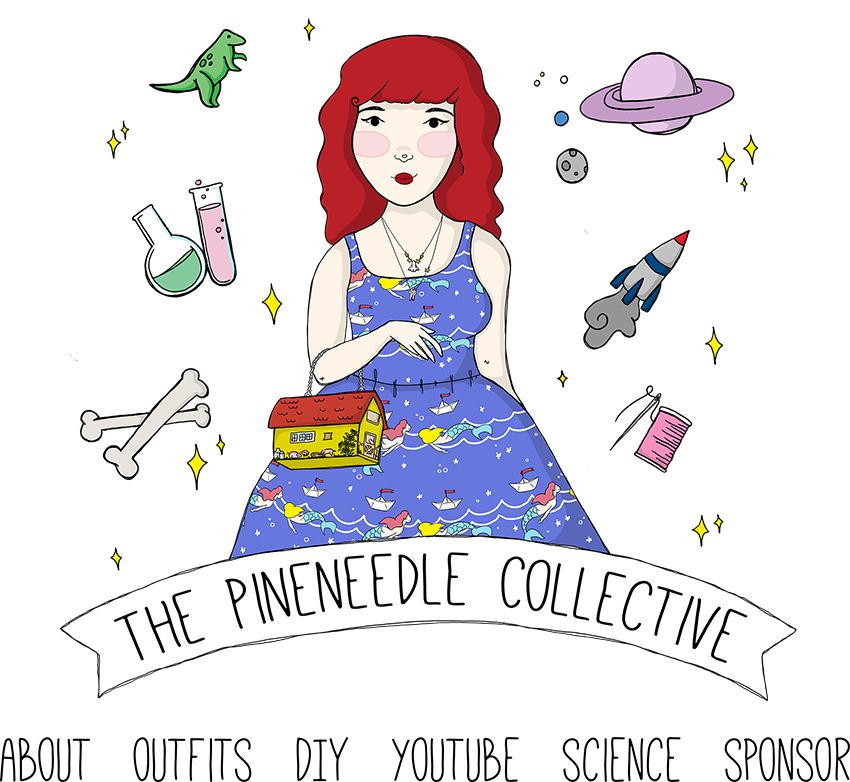Today's post is a little bit unusual because it's also being assessed as a university assignment. I am currently doing this great biochemistry course which encourages you to get creative with communicating science (which you know I am all about) and for this particular assignment I chose to make a blog post! Anyway, it won't really be any different from my usual posts, but I felt sneaky writing it without letting you all know!
Dress is DIY | cape is DIY | shoes and socks are from Japan | bag from Twinkie Chan | brooch is DIY
Is diet coke bad for you? Are artificial sweeteners a magic fix to our sugar-rich diets or are they something to watch out for?
At Uni I have been studying metabolism, and something which has been of particular interest to me is artificial sweeteners - think diet coke and Sweet'n Low - and what effects they might have on weightloss and eating behaviour. So today I'm going to explain what we currently know about artificial sweeteners - are they safe and should you consume them?
"Non-nutritive" sweeteners - also known as artificial sugars, non-caloric sugar and sugar substitutes - are hundreds of times sweeter (or 13,000x sweeter in the case of neotame) than table sugar, and because of this when you use them in foods you can use a smaller amount to achieve the same level of sweetness. Because you're using a smaller amount, you add less calories to your meal. This is why diet coke and "coke zero" are virtually sugar-free.
Some sweeteners are made of things like amino acids instead of sugar (so they are slightly calorific, but still much less so than sugar), whereas others like Sucralose are modified sugars that aren't recognized as food by the body (i.e. they don't enter into glycolysis, the body's mechanism of turning sugar into something that can be used by the body for energy) so these add zero calories to a meal.
Artificial sugars are very useful for diabetics because it allows them to consume sweet things without worrying about their blood-sugar levels shooting through the roof. More recently they've also been promoted by dieticians as a way to lower calorie intake to prevent and counteract obesity.
This is because dietary guidelines have been getting stricter on the amount of sugar that you should consume, with more evidence now pointing towards sugars, not fat, as the greatest contributor to diabetes and heart disease. So if you can replace much of the sugar in your diet with a substitute, you can still enjoy all your sugary foods with no ill effects - right?
Well, one potential problem with artificial sweeteners is something called "compensatory behaviours". This means that if you choose a diet coke over a regular, sugary coke, you then might also think "well, I guess I'm allowed to eat that whole pizza now because my coke was calorie-free!" Or, it could also be the case that your body simply doesn't get enough energy from your diet coke, so you search out more sugary foods. Obviously, this would negate any weight-loss effects of the artificial sweeteners. While this effect has been studied, no one has been able to come up with concrete, conclusive evidence either supporting or dismissing this potential problem.
Another possible problem is toxicity - could artificial sweeteners actually be bad for you? There have been a number of headline-grabbing articles that would suggest they're really bad - deadly, even - but these studies have suffered from poor methodology and have often leapt to unsupported conclusions. There's a pervasive myth (and internet hoax) that an artificial sugar called aspartame causes a whole range of diseases including MS, neurological disorders and epilepsy - which has been thoroughly debunked. Hundreds of high-quality studies have been done to demonstrate the safety of aspartame, and it is approved by regulatory bodies such as the FDA (food and drug administration). However, there are also studies that suggest that high-doses of artificial sugars can cause cancer.
In rats.
Which brings me to my next point: always be very weary about news stories reporting on studies using rats and mice when they say that those findings are absolutely applicable to humans, especially in the case of cancer. Turns out that particular strains of lab rats get cancer really, really easily. The artificial sweeteners that are widely used have been so thoroughly studied that we know they're not carcinogenic - and as long as you don't go crazy and consume about 100 diet sodas per day, you're going to be fine.
So what can be concluded about artificial sweeteners? Well, as all reputable studies regarding diets and fat/sugar substitutes seem to conclude - these may help you if you have a specific requirement (such as trying to lose weight). Just don't go crazy - anything in excess is bad for you. And as always, do a decent amount of exercise and eat a balanced diet.
Here's a link to a review paper for further reading!
(And if you found that interesting, you can also read part 1 and part 2 of my introduction to biochemistry).

Bloglovin' | Youtube | Facebook | Twitter | Instagram | Chictopia | Lookbook | Tumblr |
Showing posts with label assessment. Show all posts
Showing posts with label assessment. Show all posts
Thursday 22 May 2014
Sweet as (artificial) Sugar
Subscribe to:
Posts (Atom)









